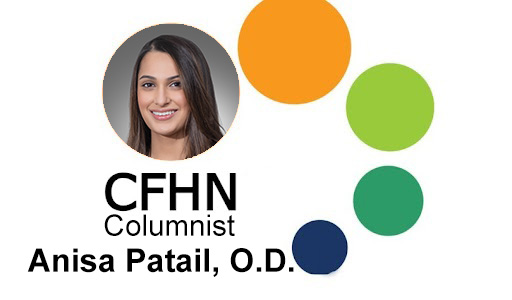by ANISA PATAIL, O.D.
Whether it’s an old wives’ tale or something a friend mentioned in conversation, you may have heard some things about your eyes that made you wonder if they are true. I’m here to put your questions to rest! Here are the myths I hear the most:
1) Eating carrots will improve your eyesight.
As kids, we heard that eating your carrots will give you healthy eyes and improve your vision. While carrots are a great source of Vitamin A, which is indeed beneficial to the eyes, they are not a magic vegetable that will correct your eyesight. Carrots will not eliminate the need to wear prescription glasses/contacts or cure any ocular disease you may have. However, nutrition does play an essential role in your vision, and it’s important to have a diet rich in vitamins and nutrients.
■ Vitamin A helps manage dry eye disease and can be found in sweet potatoes, squash, sweet red peppers, and carrots. ■ Omega 3 fatty acids are also beneficial in treating dry eye disease and can be found in fatty fish such as salmon and tuna.
■ Lutein and zeaxanthin, which are found in dark green, leafy vegetables such as spinach, kale, and arugula, are essential for macular health.
■ Vitamin C, an important factor in repairing damaged cells/tissues, can be found in foods such as oranges, bell peppers, strawberries, and tomatoes.
2) Wearing correction (prescription glasses/contacts) all the time will weaken your vision.
Many individuals express that they didn’t have any vision issues before wearing their correction, and now, when removed, they don’t see as well. This is your body’s way of telling you that it prefers the vision with correction. Sometimes, a correction will be recommended even if you have a slight prescription because it will sharpen images, keep them focused, and reduce eyestrain and fatigue. When you use your correction, the brain becomes adjusted to this new vision that is more clear and more comfortable. Once the correction comes off, your vision will not be as clear because your brain is telling you that it wants you to use your correction so you don’t strain your eyes.
3) Too much screen time will damage your eyes.
There is no harm in using cell phones, iPads, laptops, etc., if used properly. Lighting is an important factor when using these devices, so always have a well-lit screen and a well-lit environment. For example, using your phone before bedtime with a very dim screen in a dark bedroom will cause you to focus harder to see, causing eye strain. Maintaining a good distance when using these devices is also important, which is essential for children, especially if they’re nearsighted. The Harmon’s distance is how far away you should be from the device’s screen and is approximately the distance between the tip of your elbow and your first knuckle (in a closed fist). Lastly, staring at the screen for too long can cause eyestrain. Therefore, make sure to practice the 20/20/20 rule: look at something 20 feet away for 20 seconds every 20 minutes.
4) You only need an annual eye exam if you have vision problems.
An annual eye exam includes more than just checking your eyesight. During an eye exam, your eye doctor may prescribe an eyeglass/contacts prescription for several reasons: to improve the clarity of your vision, to reduce the strain put on your eyes from over-focusing, to help align the eyes to work together better, to improve symptoms of double vision, etc. Color vision, depth perception, and peripheral vision are also tested, and the health of the front and back of the eyes are examined to detect ocular conditions that can provide minimal or even no symptoms. For example, glaucoma is a condition that presents with no symptoms until it has progressed to an advanced stage, and at that point, the visual damage is irreversible. Even retinal holes or tears, which can lead to retinal detachments, can be present without any symptoms. These are a few reasons why it is important to get an annual eye exam: to detect any ocular conditions and treat them before they get serious.
The moral of the story is don’t believe everything you hear! Be sure to schedule your annual eye exam to get more of these questions answered and to ensure that you’re doing everything possible to keep your eyes seeing clearly and feeling comfortable. Call us at 800-282-3937 or visit us online at EYESFL.COM.
Bio: Dr. Anisa Patail is a board-certified optometrist who sees patients at the Haines City location for Eye Specialists of Mid-Florida. She specializes in primary care optometry and contact lenses.
This column is sponsored by Eye Specialists of Mid-Florida, and the opinions expressed herein may not reflect those of CFHN or of its advertisers.
